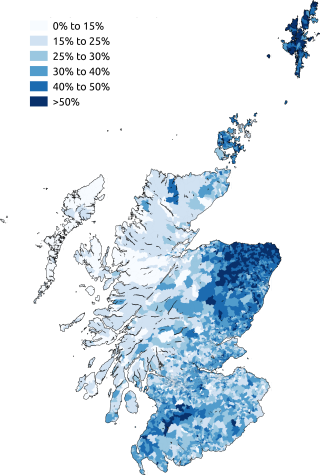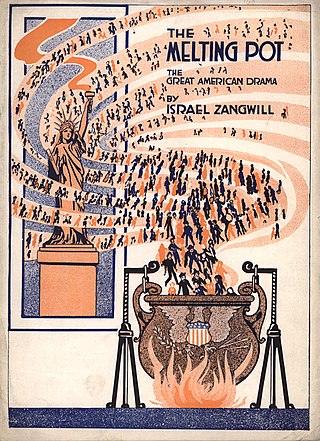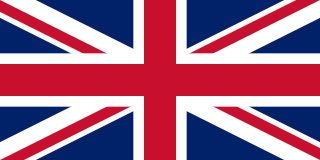Related Research Articles

Scotland is a country that is part of the United Kingdom. It contains nearly one-third of the United Kingdom's land area, consisting of the northern part of the island of Great Britain and more than 790 adjacent islands, principally in the archipelagos of the Hebrides and the Northern Isles. To the south-east, Scotland has its only land border, which is 96 miles (154 km) long and shared with England; the country is surrounded by the Atlantic Ocean to the north and west, the North Sea to the north-east and east, and the Irish Sea to the south. The population in 2022 was 5,439,842. Edinburgh is the capital and Glasgow is the largest of the cities of Scotland.

Scots is an Anglic language variety in the West Germanic language family, spoken in Scotland and parts of Ulster in the north of Ireland. Most commonly spoken in the Scottish Lowlands, Northern Isles, and northern Ulster, it is sometimes called Lowland Scots to distinguish it from Scottish Gaelic, the Goidelic Celtic language that was historically restricted to most of the Scottish Highlands, the Hebrides, and Galloway after the sixteenth century; or Broad Scots to distinguish it from Scottish Standard English. Modern Scots is a sister language of Modern English, as the two diverged independently from the same source: Early Middle English (1150–1350).

A melting pot is a monocultural metaphor for a heterogeneous society becoming more homogeneous, the different elements "melting together" with a common culture; an alternative being a homogeneous society becoming more heterogeneous through the influx of foreign elements with different cultural backgrounds. It can also create a harmonious hybridized society known as cultural amalgamation. In the United States, the term is often used to describe the cultural integration of immigrants to the country. A related concept has been defined as "cultural additivity."
Anglo is a prefix indicating a relation to, or descent from England, English culture, the English people or the English language, such as in the term Anglosphere. It is often used alone, somewhat loosely, to refer to people of British descent in Anglo-America, the Anglophone Caribbean, South Africa, Namibia, Australia, and New Zealand. It is used in Canada to differentiate between French-speaking Canadians (Francophones), located mainly in Quebec but found across Canada, and English-speaking Canadians (Anglophones), also located across Canada, including in Quebec. It is also used in the United States to distinguish the Latino population from the non-Latino white majority.
This glossary of names for the British include nicknames and terms, including affectionate ones, neutral ones, and derogatory ones to describe British people, Irish People and more specifically English, Welsh, Scottish and Northern Irish people. Many of these terms may vary between offensive, derogatory, neutral and affectionate depending on a complex combination of tone, facial expression, context, usage, speaker and shared past history.

The Chinese people, or simply Chinese, are people or ethnic groups identified with China, usually through ethnicity, nationality, citizenship, or other affiliation.

The French people are a nation primarily located in Western Europe that share a common French culture, history, and language, identified with the country of France.
Since 1945, immigration to the United Kingdom, controlled by British immigration law and to an extent by British nationality law, has been significant, in particular from the Republic of Ireland and from the former British Empire, especially India, Bangladesh, Pakistan, the Caribbean, South Africa, Nigeria, Ghana, Kenya, and Hong Kong. Since the accession of the UK to the European Communities in the 1970s and the creation of the EU in the early 1990s, immigrants relocated from member states of the European Union, exercising one of the European Union's Four Freedoms. In 2021, since Brexit came into effect, previous EU citizenship's right to newly move to and reside in the UK on a permanent basis does not apply anymore. A smaller number have come as asylum seekers seeking protection as refugees under the United Nations 1951 Refugee Convention.
In law, an alien is generally any person who is not a citizen or a national of a specific country, although definitions and terminology differ across legal systems.
Scotch-IrishAmericans are American descendants of primarily Ulster Scots people who emigrated from Ulster to the United States during the 18th and 19th centuries. Their ancestors had originally migrated to Ulster, mainly from the Scottish Lowlands and Northern England in the 17th century. In the 2017 American Community Survey, 5.39 million reported Scottish ancestry, an additional 3 million identified more specifically with Scotch-Irish ancestry, and many people who claim "American ancestry" may actually be of Scotch-Irish ancestry.

British national identity is a term referring to the sense of national identity, as embodied in the shared and characteristic culture, languages and traditions, of the British people. It comprises the claimed qualities that bind and distinguish the British people and form the basis of their unity and identity, and the expressions of British culture—such as habits, behaviours, or symbols—that have a common, familiar or iconic quality readily identifiable with the United Kingdom. Dialogue about the legitimacy and authenticity of Britishness is intrinsically tied with power relations and politics; in terms of nationhood and belonging, expressing or recognising one's Britishness provokes a range of responses and attitudes, such as advocacy, indifference, or rejection.

The Scottish diaspora consists of Scottish people who emigrated from Scotland and their descendants. The diaspora is concentrated in countries such as the United States, Canada, Australia, England, New Zealand, Ireland and to a lesser extent Argentina, Chile, and Brazil. The Scottish diaspora has been estimated by the Scottish Government to be between 28 and 40 million people worldwide. Other estimates have ranged as high as 80 million.
According to the 2021 Canadian census, immigrants in Canada number 8.3 million persons and make up approximately 23 percent of Canada's total population. This represents the eighth-largest immigrant population in the world, while the proportion represents one of the highest ratios for industrialized Western countries.
Illegal immigration is the migration of people into a country in violation of that country's immigration laws, or the continuous residence in a country without the legal right to do so. Illegal immigration tends to be financially upward, from poorer to richer countries. Illegal residence in another country creates the risk of detention, deportation, and other imposed sanctions.

The history of immigration to the United States details the movement of people to the United States from the colonial era to the present day. Throughout U.S. history, the country experienced successive waves of immigration, particularly from Europe and later on from Asia and Latin America. Colonial-era immigrants often repaid the cost of transoceanic transportation by becoming indentured servants in which the new employer paid the ship's captain. In the late 19th century, immigration from China and Japan was restricted. In the 1920s, restrictive immigration quotas were imposed but political refugees had special status. Numerical restrictions ended in 1965. In recent years, the largest numbers of immigrants to the United States have come from Asia and Central America.

Since 1922, the United Kingdom has been made up of four countries: England, Scotland, Wales and Northern Ireland. The UK Prime Minister's website has used the phrase "countries within a country" to describe the United Kingdom.

British people or Britons, also known colloquially as Brits, are the citizens of the United Kingdom, the British Overseas Territories, and the Crown dependencies. British nationality law governs modern British citizenship and nationality, which can be acquired, for instance, by descent from British nationals. When used in a historical context, "British" or "Britons" can refer to the Ancient Britons, the Celtic-speaking inhabitants of Great Britain during the Iron Age, whose descendants formed the major part of the modern Welsh people, Cornish people, Bretons and considerable proportions of English people. It also refers to citizens of the former British Empire, who settled in the country prior to 1973, and hold neither UK citizenship nor nationality.

Canadians are people identified with the country of Canada. This connection may be residential, legal, historical or cultural. For most Canadians, many of these connections exist and are collectively the source of their being Canadian.

The Scottish people or Scots are an ethnic group and nation native to Scotland. Historically, they emerged in the early Middle Ages from an amalgamation of two Celtic peoples, the Picts and Gaels, who founded the Kingdom of Scotland in the 9th century. In the following two centuries, Celtic-speaking Cumbrians of Strathclyde and Germanic-speaking Angles of Northumbria became part of Scotland. In the High Middle Ages, during the 12th-century Davidian Revolution, small numbers of Norman nobles migrated to the Lowlands. In the 13th century, the Norse-Gaels of the Western Isles became part of Scotland, followed by the Norse of the Northern Isles in the 15th century.
Discrimination based on nationality is discriminating against a person based on their nationality, country of citizenship, or national origin. Although many countries' non-discrimination laws contain exceptions for nationality and immigration status, nationality is related to race and religion, so direct discrimination on the basis of nationality may be indirect discrimination on racial or religious grounds. The International Convention on the Elimination of All Forms of Racial Discrimination (CERD), currently signed by 88 countries, allows discrimination by nationality, citizenship or naturalization but prohibits discrimination "against any particular nationality".
References
- ↑ Maan, Bashir (1997). The New Scots: The Story of Asians in Scotland. John Donald Publishers Ltd. ISBN 978-0859763578.
- ↑ Devine, Tom M. (2018). New Scots: Scotland's Immigrant Communities since 1945. Edinburgh University Press. ISBN 978-1-4744-3790-5.
- ↑ Scottish Executive (2004). New Scots: Attracting Fresh Talent to Meet the Challenge of Growth. Scottish Executive. Archived from the original on 20 January 2019.
- ↑ Scottish Government (2018). New Scots: Refugee Integration Strategy: 2018–2022. Scottish Government.
- ↑ Scottish Government (2024). New Scots Refugee Integration Strategy (PDF). Scottish Government.